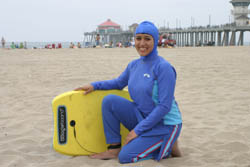Is it time to hang up your bikini and try a burkini?Baltimore Muslim Examiner Posted on May 4, 2009
In pre-Islamic Arabia, some traditions report that people made Tawaf (circling the Ka'bah) naked and women wore tunics with a wide opening at the top that exposed their breasts. Islam stopped these practices, requiring both men and women to cover their nakedness: "O Children of Adam! We have bestowed raiment upon you to cover your private parts and as an adornment; and the raiment of righteousness, that is better. Such are among the Ayat (signs) of Allaah, that they may remember." (The Noble Qur'an, 7:26) According to the Ma'ariful Qur'an Tafsir (a commentary on the Qur'an), this verse addresses all humanity and tells us that clothing is a great blessing that should be recognized. In fact, when Muslims dress, we are encouraged to express our gratitude by saying: "Praise is to Allah Who has clothed me with this (garment) and provided it for me, though I was powerless myself and incapable." In Islamic terms, covering one's nakedness is referred to as protecting one's 'awrah. Islamic scholars agree that a man's 'awrah is the area between his navel and knees. With respect to women, scholars of the four main schools of thought agree that the face and hands can be exposed in public but differ with respect to feet. Some Hanafi scholars state that a woman's feet are not part of the 'awrah and therefore do not need to be covered. The three other schools and other Hanafi scholars consider feet nakedness. In any event, it is quite clear that the more revealing, western-style swimsuits are inappropriate for Muslim women to wear in public. What is becoming increasingly more clear to non-Muslim women, however, is that Islamic swimwear might be appropriate for them. The most common form of cancer in the United States is skin cancer. While the two most common types--basal cell and squamous cell carcinomas--are highly curable, melanoma, the third, is more difficult to treat and more deadly. In 2005, the most recent year for which statistics are available, 53,792 people in the United States were diagnosed with melanomas and 8,345 people died. The majority of melanomas (65%-90%) are caused by exposure to sunlight (or ultraviolet light). According to the Centers for Disease Control and Prevention (CDC), the best way to prevent skin cancer is to protect yourself from the sun. CDC recommendations include: seek shade during midday hours when ultraviolet rays are the strongest; wear a wide-brimmed hat to shield the face, head, ears, and neck; wear wrap-around sunglasses; use sunscreen that is SPF 15 or higher and provides both UVA and UVB protection; and cover up with clothing to protect exposed skin. The latter is where Islam fits in. There are several brands of Islamic swimwear on the market today. The style that I wear is made by the online company Splashgear, founded by Shereen Sabet, an assistant professor of biology at a California university and a scuba diver. In an interview with examiner.com, Sabet said that she sells her swimwear all over the United States and overseas, both retail and wholesale. In Dearborn, Michigan, a Muslim girls' swim team is now outfitted with the Splashgear line.
Although most of her clients are Muslims, many non-Muslims buy her swimwear as well. The modest style not only appeals to conservative Christians and Jews, but also to older women, women with skin conditions or physical abnormalities, and some women who just prefer to dress modestly. Muslim and Mormon men also have contacted her and she hopes to develop modest swimwear for men in the future, insha'Allaah (God-willing). Sabet has received a lot of positive feedback on her swimwear line. For example, Shazia of Herndon, Virginia, states in her online testimonial entitled "Best Islamic Swimsuit!" (entered 4/09): "I have tried several different 'Islamic' swimsuits and appreciate this one the most! It is very lightweight and dries quickly. I also appreciate all the improvements that Splashgear has recently made to continue making even better suits. Very functional and practical. Thanks for creating this line!" Sabet finds it "very satisfying to serve the needs of other people," which she believes is a fundamental part of her faith. She also believes that Splashgear has "become a vehicle to help clarify misconceptions about Islam and Muslim women and ... is helping to bring Muslims and non-Muslims together." Other companies that also offer modest swimwear include, among others: Acquagym, Ahiida, Bodykini, Primo Moda, and Sajeda. In fact, modest swimwear's popularity has increased to the point that it is now for sale in mainstream venues such as SwimOutlet.com. So is it time to hang up your bikini and try a burkini?* Ask your Muslim "sisters", they know. *Burkini (Burqa + Bikini) Burqini®™ is a registered trademark of Ahiida. For more info: Mayo Clinic on Skin Cancer, Coolibar Sun Protective Clothing |
.jpg)

